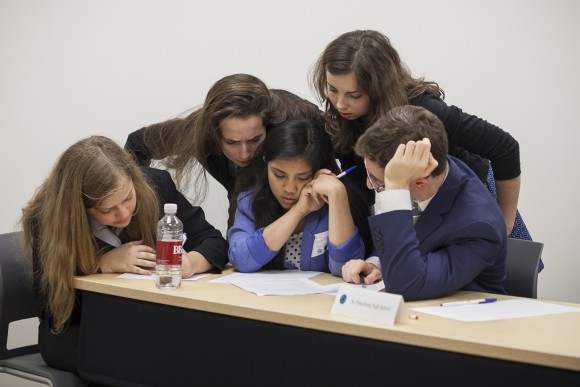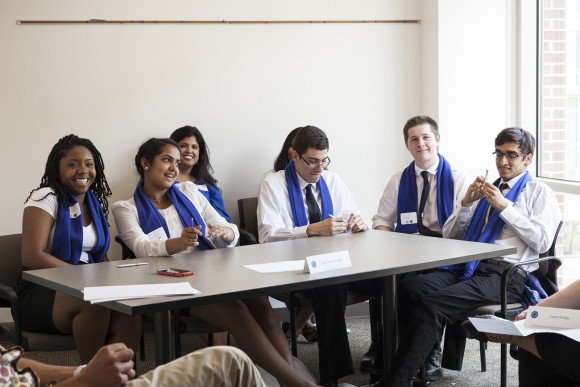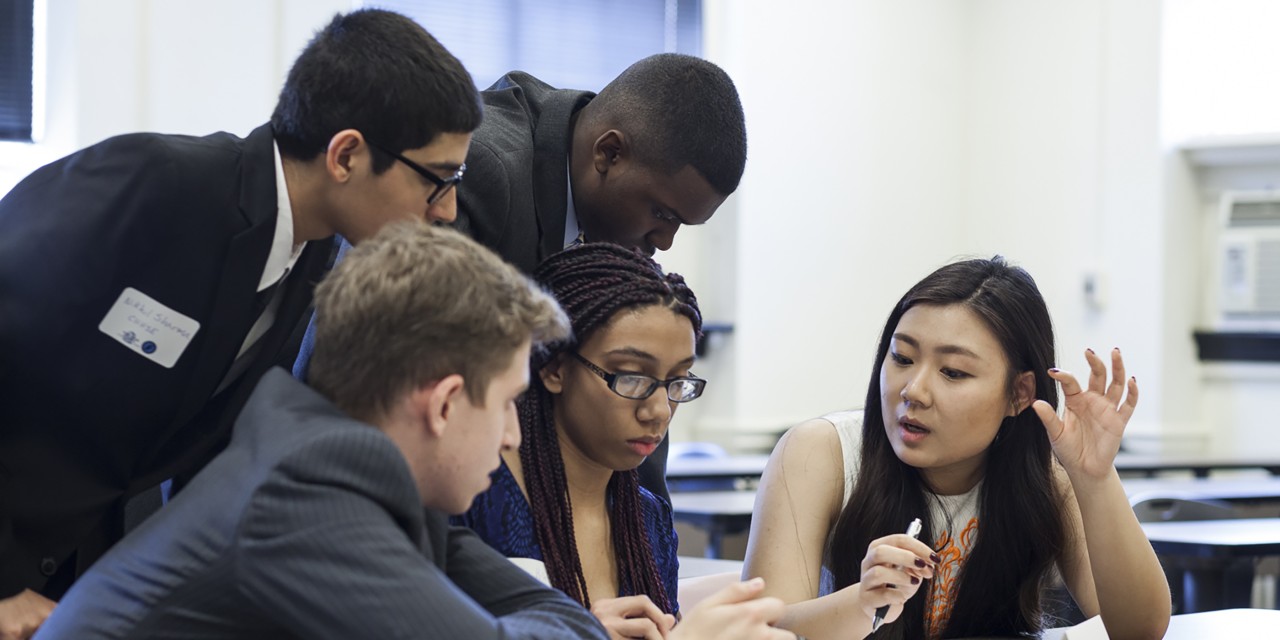Headquartered at the Parr Center for Ethics at the University of North Carolina-Chapel Hill, the National High School Ethics Bowl brings high school students together to discuss complex ethical dilemmas after school and in regional and national competitions. The National High School Ethics Bowl focuses on a new set of cases each year, ranging from what to do when you don’t get along with your best friend’s girlfriend to the ethical considerations involved in the use of an anti-opioid drug.

Unlike in traditional high school debating, students do not have to disagree in the National High School Ethics Bowl. While the issues under discussion are likely to spark disagreement, participating students are free to take whatever position they believe to be most ethical. Director Dominique Dery says that students are scored on their ability to collaborate, to think deeply, and to speak clearly about complex subjects as full community members.
“The National High School Ethics Bowl prioritizes high school students’ own opinions, own thoughts, and importance as citizens of our democratic community, prioritizing their agency as thinkers and community members,” Dery notes. “That’s what makes the National High School Ethics Bowl really special. I think it’s really fun and challenging to get together with a diverse group of high school students to talk about controversial issues in a way that’s productive and collaborative, when there might be really deep disagreements. It’s both an essential skill in a democratic community and in high school and I think it can be really engaging in a way that is meaningful and lively and vibrant and fun.”
Participating high school students meet throughout the year with coaches from the community and local universities, colleges, and high schools, discussing cases produced at the UNC Parr Center for Ethics in preparation for regional and national competitions.
In the regional and national competitions, two teams meet before panels of judges from the community and local universities, colleges, and high schools. The teams are presented with different cases, usually drawn from the set produced by the Parr Center for Ethics. Each team gets an opportunity to engage with their case in a structured dialog with the judges and the opposing team—during which they are free to agree or disagree.
“The idea in the competition is we prioritize clarity and comprehensiveness of answers to important questions in the cases,” Dery explains. “We also reward students for their sense of collaboration in the events themselves, their ability to empathize with many different viewpoints, and to speak kindly and productively to the each of those viewpoints in their responses.”
Based on the judges’ scoring, teams win, lose, or tie. Teams advance through a series of rounds, meeting other teams in competition until one team wins the day.

Cases are both timeless and timely, often ripped from the front page of the newspaper. One sample case used in 2016-2017 explores the ethics of naloxone, a medication that reverses opioid overdoses.
“In 2015, the FDA approved a pocket-sized naloxone auto-injector, making the antidote even more accessible for use in a nonmedical environment,” the case notes. “As the prevalence of opioid addiction and overdoses continues to rise, questions about naloxone’s availability and distribution are made even more significant. Many wonder: Is naloxone enabling opioid addicts, and if so, do the harms outweigh the benefits?”
In the 2017 national competition, students were asked to consider the morally relevant similarities and differences between providing opiate users easy access to naloxone and providing epinephrine to anaphylactic patients.
“It’s a great question,” Dery explains. “It speaks directly to the issue, but it also brings in an interesting comparison that hopefully both challenges the students and makes their response more concrete.”
While competition is a draw for participants, the National High School Ethics Bowl places more emphasis on the cultivation of critical thinking and democratic engagement. This is not lost on the students.
“We have survey data about how this helps students with thinking, writing, and especially public speaking, and has changed their thinking about future careers,” Dery explains. “It helps students find skills or interests that they never had before and pushes them to challenge their comfort with being a public voice.”
“I loved that the National High School Ethics Bowl made me think critically, engage in discussion, learn new ethical theories, and make new friends,” one student reported.
Another praised the diversity of the group: “I loved getting to hear the stances of other teams from around the country. It challenged me to continually form my opinions on the cases. It was encouraging to see other students who also deeply cared about ethical issues. I am definitely more confident in sharing my views and having respectful dialogue thanks to National High School Ethics Bowl.”
Regional and national competitions create opportunities for meaningful exchange between students from different places and backgrounds.
“The schools that come to the nationals are extremely diverse in geographic location, but also there are public schools and private schools with a lot of socio-economic diversity and a wide variety of viewpoints on ethical dilemmas and moral and political issues,” Dery explains. “That’s something that really excites students. It’s especially engaging because the focus on the collaborative, productive, and empathetic tone stretches students to put themselves in the position of the kinds of students they may not encounter in their everyday life.”
Wherever you live in the United States, there are many ways to become involved in the National High School Ethics Bowl. If you are a high school teacher or student, you can start a team. If you are a faculty member or graduate student at a university or college, you can support or start a new regional competition. Visit the program website for more information.
